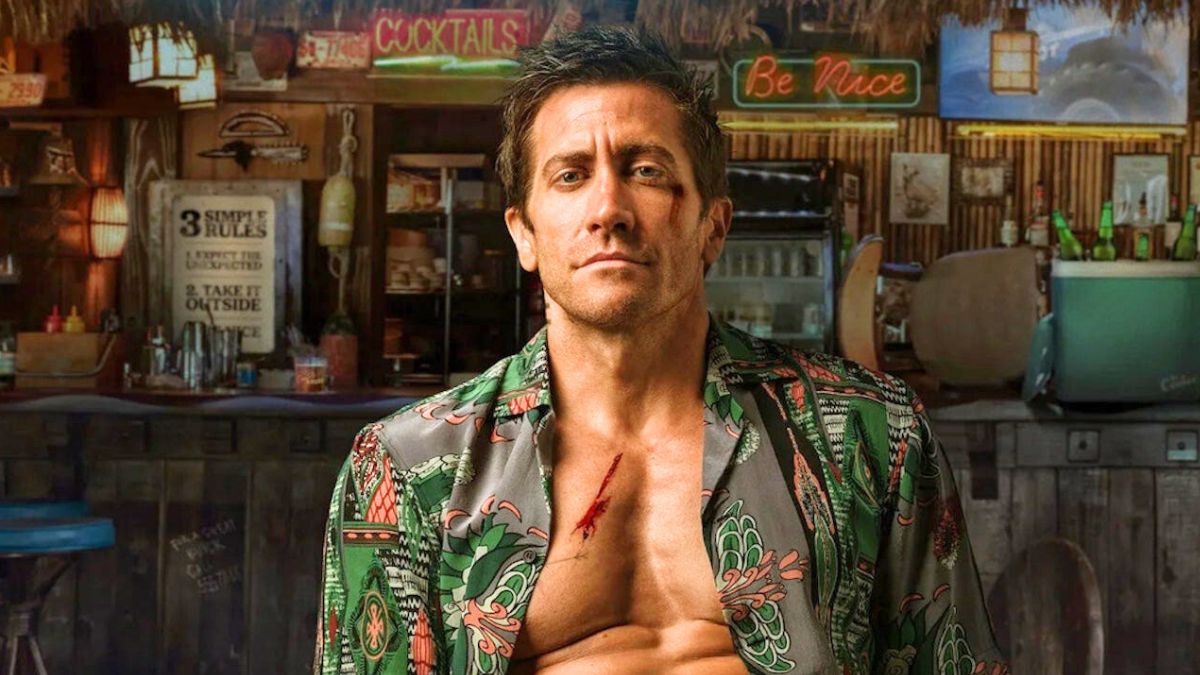On paper, it was supposed to be a grand slam dunk. One of the most beloved brawling movies of all time in Road House, one of the best actors around in Jake Gyllenhaal and a company that was eschewing standard moviemaking in Amazon Studios.
Unfortunately, nothing turned out as anyone would have hoped. The director is boycotting the film and the original screenwriter is now suing Amazon Studios for copyright infringement. How did it all go so wrong?
Let’s start with the start: the original Roadhouse. Released in 1989, Roadhouse tells the story of James Dalton, a cooler hired to turn a raucous honkytonk club into a respectable enterprise. Played by Patrick Swayze with enough swag and sex appeal to fill a swimming pool, it’s an American classic. Oh, and Dalton has a black belt in karate AND a Ph.D. in philosophy.
The plot is fairly straightforward. Dalton annoys the wrong person when he fires a bunch of employees and in the process finds himself in the crosshairs of the town’s business tycoon and drug lord, named Brad Wesley (Ben Gazzara), who holds the town under his iron grip by using his henchman and intimidation. Dalton tries to improve the Double Deuce while Wesley tries to sabotage the club and kill him. It also stars Kelly Lynch as a love interest and Sam Elliot as a fellow bouncer.
The remake, which has gone through various actors and writers over the years, is set for release on Prime Video on Mar. 21. It stars Gyllenhaal as a UFC middleweight fighter who ends up working at a “roadhouse” in Florida. The movie supposedly follows some of the same story beats as the original. The original movie was written by R. Lance Hill, who goes by the pen name of David Lee Henry. This brings us to the lawsuit.
The ‘Roadhouse’ Lawsuit
This is where things get juicy. Hill filed a lawsuit for copyright infringement against Metro-Goldwyn-Mayer Studios along with its parent company, Amazon Studios. He alleges that Amazon deliberately ignored his attempts to get back the rights to the screenplay because it would interfere with the company’s remake. He says Amazon put a deadline on finishing the film (Nov. 10) before the copyright expired and Hill would be able to reclaim his work.
Hill asked the U.S. Copyright Office to return the work to him after the rights expired in November 2023. Hill claims that Amazon didn’t finish the remake in time, due to the writer’s strike, until the end of January this year. The complaint says that the studio “steamrolled ahead with the production of a remake of the 1989 Film derived from Hill’s Screenplay.” To do this, he alleges, the studio used generative artificial intelligence to recreate actors’ voices and finish the film. If this is true, it would mean that Amazon broke the collective bargaining agreements of the strike with SAG-AFTRA and the Director’s Guild of America.
This lawsuit has huge implications for the future of Hollywood itself, and could very well set a precedent for how studios are allowed to use AI moving forward. The lawsuit is the latest in a series of them by the original authors of works like Friday the 13th and The Terminator. There’s a provision in copyright law that allows authors to reclaim the rights to their work after a period of time, generally around 30 years. This is of course bad news for studios who stand to lose rights to some of the most popular and lucrative franchises in movie history.
The lawsuit also says that Amazon used AI to finish the film at a “considerable additional cost” instead of honoring his copyright claim. An Amazon spokesperson released a statement denying the claims.
“The lawsuit filed by R. Lance Hill regarding Road House today is completely without merit and numerous allegations are categorically false. The film does not use any AI in place of actors’ voices. We look forward to defending ourselves against these claims.”
Hill wants damages and a court order that validates his November 11, 2023 claim on the work. Amazon Studios, he said, didn’t have “rights to make, produce or distribute the 2024 Remake or any other post-termination derivative work based in whole or in part on the Screenplay and/or the 1989 Film (as derived from the Screenplay).”
A lot of things could end up happening here, but most likely they’ll go back and forth for a while and then come to an agreement aka they’ll pay Hill enough money that he won’t care whether or not Amazon used AI or not. If he sticks to his guns and takes it to court, things could get interesting.
This fiasco is the latest controversy in a movie that’s just been mired in them. Before the lawsuit, the movie’s director got into it with Amazon over its release being streamed and not put in actual movie theaters. Director Doug Liman decided to boycott the film’s premiere because he claims the studio promised him the film would be released in theaters. He released a fiery statement saying that the studio “seems intent on burying” the movie in streaming and not on “the big screen where great movies and movie stars belong.” Studios should put up a sign, he said, that says, “TALENT BEWARE, NOT WELCOME HERE.”
Interestingly, Gyllenhaal recently was interviewed by Total Film and pushed back on those claims: “I adore Doug’s tenacity, and I think he is advocating for filmmakers, and film in the cinema, and theatrical releases. But, I mean, Amazon was always clear that it was streaming.”
Hill’s lawyer, Marc Toberoff, argues that studios keep exploiting talent despite “the asset base of all major entertainment studios” being content. “It is time they respect the fundamental rights and artistry of creators on whose sweat and toil their empires are based.”











Published: Feb 28, 2024 05:01 am